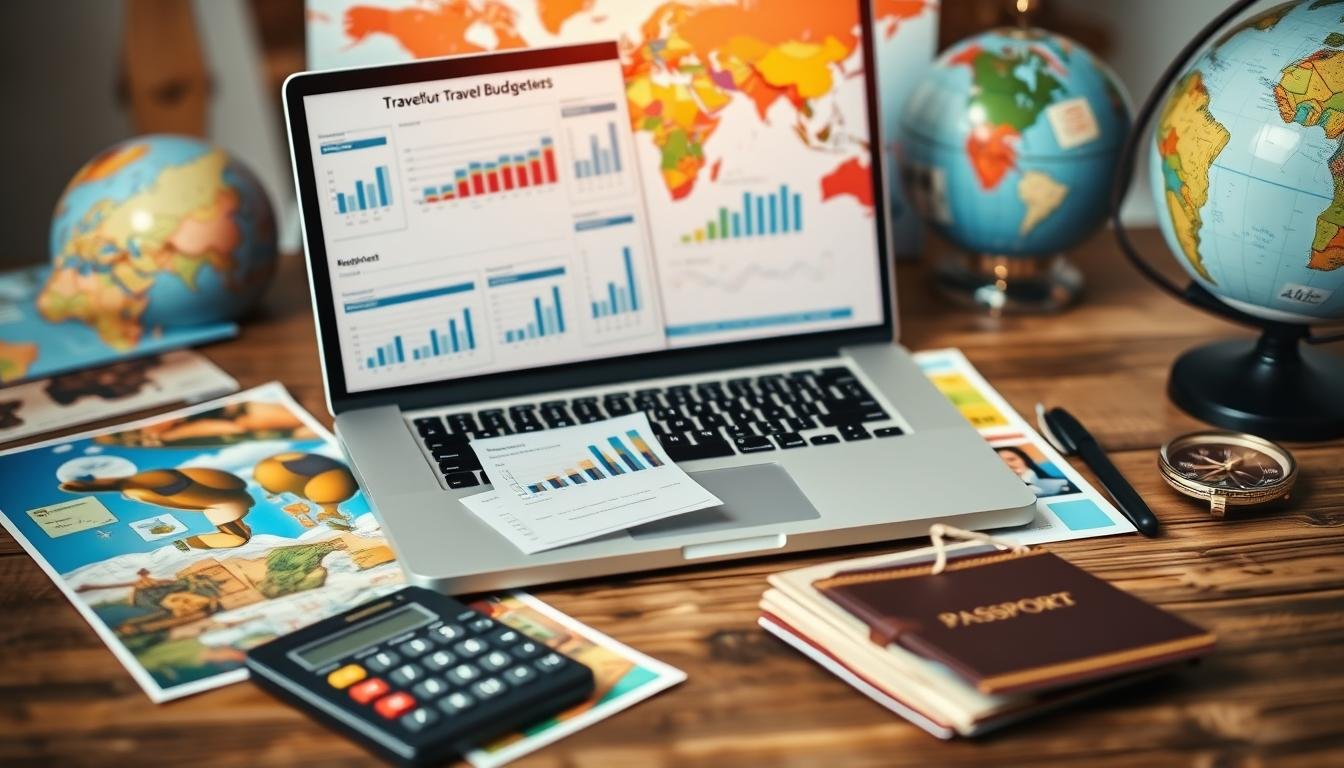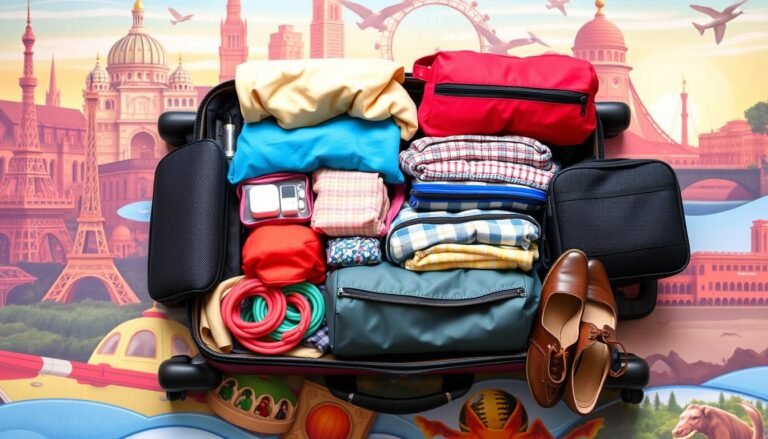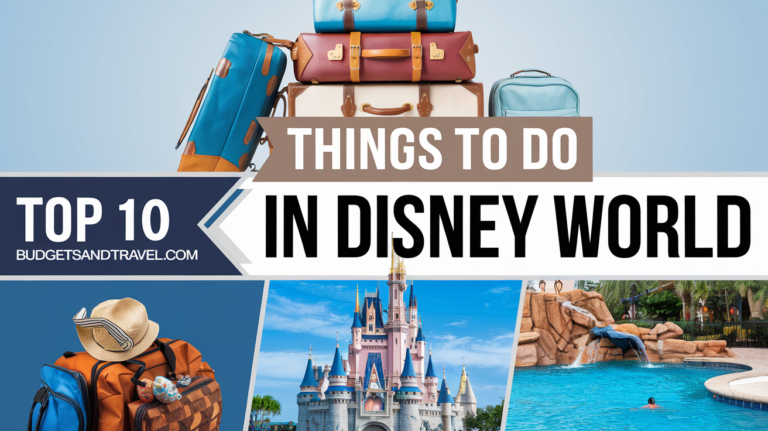How to Create a Travel Budget: A Step-by-Step Guide
Starting your travel journey with a solid budget is key. Whether it’s a big dream trip or a quick local escape, a good budget can turn your travel into a worry-free adventure. This guide will show you how to make a travel budget. You’ll learn how to plan your spending, save money, and enjoy your trip without stress.
This post may contain affiliate links. If you make a purchase or booking through one of our links, we may earn a small commission. As an Amazon Associate, I earn from qualifying purchases. The content on this website was created with the help of AI.
Key Takeaways
- Understand the importance of travel budget planning to ensure a seamless and financially responsible vacation.
- Identify the core components of a travel budget, including transportation, accommodation, daily spending, and emergency funds.
- Discover effective strategies for research, price comparison, and finding the best deals to maximize your travel budget.
- Learn how to set realistic daily spending limits and plan for hidden expenses to avoid unexpected costs.
- Explore money-saving tips that can help you stretch your travel budget and enjoy more of your destination.
Understanding the Importance of Travel Budget Planning
Creating a detailed travel budget is key to a memorable trip. It helps plan your spending on transportation, accommodation, and daily costs. This way, you can enjoy your trip without worries.
Let’s look at why budgeting is important and how to avoid common mistakes.
Benefits of Structured Travel Budgeting
Having a budget helps you make the most of your trip. It lets you plan your spending wisely. This way, you can avoid overspending and unexpected costs.
Common Budgeting Mistakes to Avoid
It’s important to avoid common budgeting errors. These include forgetting about hidden costs, underestimating local transport, and not planning for currency changes. By knowing these pitfalls, you can keep your budget in check.
Impact on Travel Experience
A good budget keeps your finances safe and improves your travel experience. It lets you enjoy your trip without worrying about money. On the other hand, poor budgeting can ruin your journey and limit your memories.
Learning to plan your travel budget is a big step. It helps you make the most of your trips. By knowing the benefits and avoiding mistakes, you can travel with confidence and smartly.
“Proper planning prevents poor performance. A travel budget is the roadmap to an unforgettable journey.”
Essential Tools for Travel Budget Management
Managing your travel budget is easy with the right tools. You can use digital spreadsheets or mobile apps. These tools help you track expenses, plan costs, and control your spending.
Digital Budgeting Spreadsheets
Software like Microsoft Excel or Google Sheets is great for budgeting. You can make your own templates and track your spending in real-time. It’s easy to access your budget from any device, making it perfect for affordable travel budgeting and budget-friendly travel planning.
Dedicated Travel Budgeting Apps
- Apps like Tripcoin, Trail Wallet, and Travel Spend make tracking expenses easy.
- They let you categorize costs, create reports, and sync data across devices.
- Features like currency conversion and budget alerts help you stay on track.
Online Budgeting Platforms
Platforms like Mint and You Need a Budget (YNAB) offer full finance management. They connect with your bank accounts and credit cards. This way, you can see all your spending in one place.
“Having the right tools to manage my travel budget has been a game-changer. I can easily track expenses, plan for upcoming trips, and stay within my limits without the stress.”
Using these tools makes affordable travel budgeting and budget-friendly travel planning a breeze. You’ll enjoy your trips more without worrying about money.
How to Create a Travel Budget: Core Components
Making a travel budget is more than just guessing the total cost. It’s important to split your budget into main parts. This helps you see where your money goes and where you can save.
Transportation Costs Breakdown
Transportation costs are usually the biggest part of a trip. Think about how you’ll travel, like by plane, train, or car. Also, remember to add in costs like airport transfers, gas, and public transport. This will help you plan your frugal travel budgeting better.
Accommodation Expenses
Where you stay can greatly affect your budget. Look into hotels, Airbnbs, hostels, and camping. Find the best cost-effective travel organizing options that fit your needs.
Daily Spending Allowance
Set a daily budget for food, fun, and extras. Think about the local prices, how you spend money, and any deals you can use. This will help you save more with your frugal travel budgeting.
Emergency Fund Allocation
Even with good planning, surprises can happen. Save a bit of your budget for emergencies. This could be for medical needs, travel problems, or other unexpected things. It keeps your cost-effective travel organizing trip smooth and stress-free.
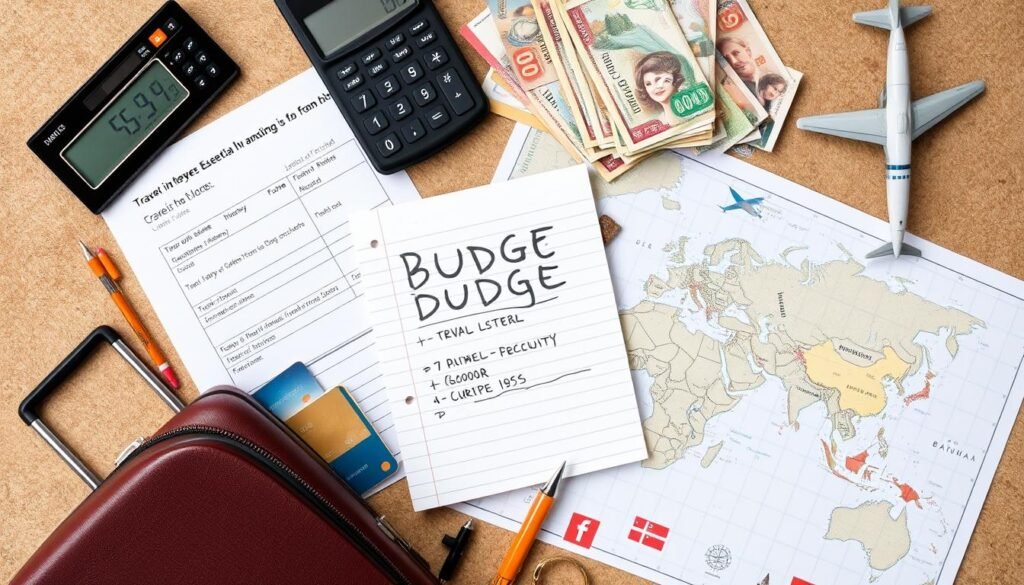
“Proper budgeting is the key to unlocking a truly memorable and stress-free travel experience.”
Determining Your Total Trip Cost
It’s important to estimate your travel expenses accurately. This helps you set a realistic budget for your vacation. Think about your destination, how long you’ll stay, and your travel style. This way, you can plan a budget that covers all your costs.
Start by breaking down your expenses into main categories:
- Transportation (flights, trains, rental cars, etc.)
- Accommodation (hotels, Airbnbs, hostels, etc.)
- Daily spending (meals, activities, entertainment, local transportation)
- Incidentals (travel insurance, visas, baggage fees, etc.)
To get a good estimate, look up costs for each category for your trip. Use online vacation cost estimator and travel expenses calculator tools. Think about the season, how many people are traveling with you, and your comfort level.
| Expense Category | Estimated Cost |
|---|---|
| Transportation | $1,200 |
| Accommodation | $2,500 |
| Daily Spending | $1,800 |
| Incidentals | $500 |
| Total Trip Cost | $6,000 |
By thinking about all possible expenses, you can make a detailed vacation cost estimator. This will help you plan your budget well. You’ll know you have enough money for a great vacation without any surprises.
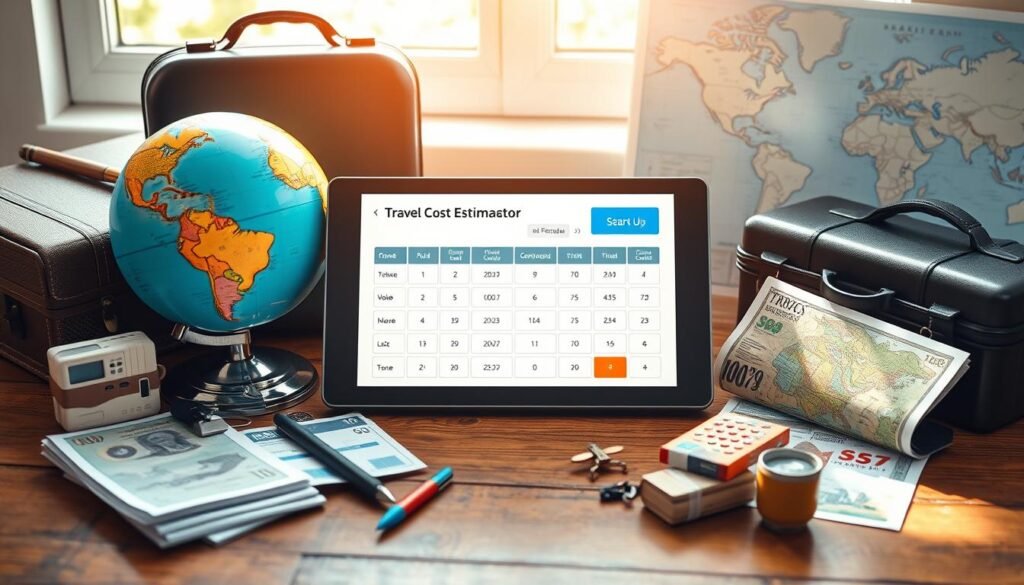
Research and Price Comparison Strategies
To make a travel budget affordable, you need to do some smart planning. Look for the best times to book your travel and stay. Also, find hidden deals and use tools to track prices.
Best Time to Book
When it comes to saving money, timing is everything. It’s wise to book flights and hotels well in advance. This way, you avoid higher prices that come closer to your trip.
Also, flying on weekdays can save you money compared to weekends.
Deal-Finding Techniques
- Use online travel sites to compare prices from different airlines and hotels.
- Get price alerts to know when prices drop on your chosen routes or places.
- Look into other airports or places to stay for cheaper options.
- Book packages that include flights, hotels, and activities for a discount.
Price Tracking Tools
Price tracking tools can really help with saving money on travel. They watch airfare and hotel prices for you. This way, you can find the best times to book and deals.
Some top tools include:
| Tool | Description |
|---|---|
| Hopper | Predicts future flight and hotel prices, helping you decide the best time to book. |
| Skyscanner | Allows you to compare prices across multiple airlines and booking sites. |
| Google Flights | Provides price tracking and alerts, as well as flexible date and destination options. |
By using these strategies, you can find great deals on travel. This way, your dream trip can be affordable and fun.
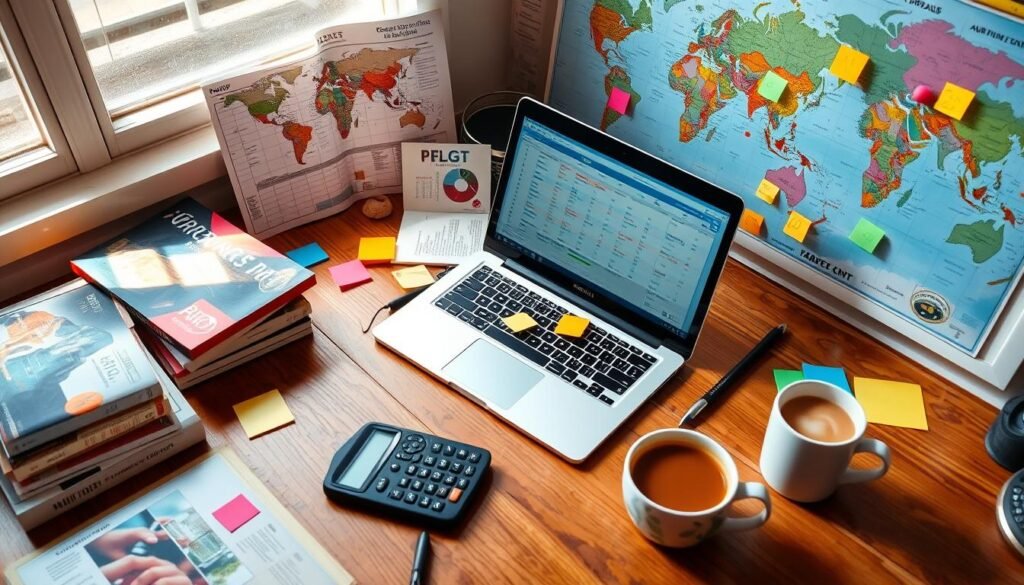
Setting Realistic Daily Spending Limits
As a travel finance planner, it’s key to set daily spending limits. This helps you enjoy your trip while keeping costs down. Finding the right balance is crucial for a successful and frugal travel budgeting experience.
To figure out your daily limit, think about a few things:
- Destination and local cost of living: Look up average prices for meals, transport, and activities. This helps you understand the local costs.
- Length of your trip: The longer you’re away, the more careful you should be with spending. This prevents your budget from running out too fast.
- Planned activities and experiences: Make sure to include the costs of any activities or tours you want to do. This ensures you have enough money each day.
- Unexpected expenses: Always leave some extra money for surprises like souvenirs, medical issues, or travel delays.
After considering these points, set a daily spending limit that lets you enjoy your trip without overspending. Remember, sticking to your budget doesn’t mean missing out on memorable experiences.
“The key to successful frugal travel budgeting is finding the right balance between enjoying your travels and staying within your financial means.”
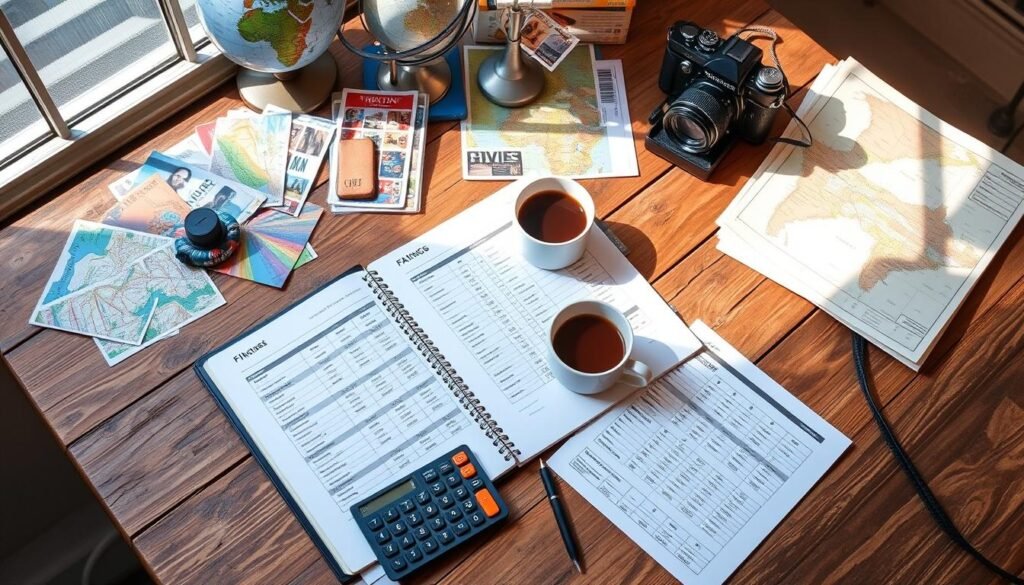
By setting realistic daily limits and staying disciplined, you can avoid financial trouble on your trip. With some planning and focus, you can make a travel finance planner that lets you enjoy your vacation without hurting your finances.
Planning for Hidden Travel Expenses
Creating a detailed travel budget is more than just adding up obvious costs like flights, hotels, and food. It’s also key to plan for hidden expenses that can surprise you if not thought of ahead. This way, your trip can be both smooth and affordable.
Insurance and Documentation Costs
Getting the right travel insurance can be a lifesaver for unexpected medical issues, trip cancellations, or lost items. Also, getting the needed travel documents, like visas and passports, can cost extra. These should be included in your travel cost breakdown.
Local Transportation Expenses
Remember to include the cost of getting around your destination. This could be public transport, Uber, or taxis. Knowing how to move around and the costs can help with cost-effective travel organizing.
Unexpected Situations
Things like flight delays, medical emergencies, or accidents can cause extra costs. Having a special emergency fund in your budget can help. It ensures your trip stays enjoyable and worry-free.
| Expense Category | Estimated Cost |
|---|---|
| Travel Insurance | $50 – $200 |
| Visa and Passport Fees | $50 – $300 |
| Local Transportation | $20 – $100 per day |
| Emergency Fund | $200 – $500 |
By thinking about these hidden travel costs and adding them to your budget, you can have a worry-free and affordable trip. This lets you enjoy your adventure without financial stress.
Money-Saving Tips for Budget Travelers
Traveling doesn’t have to be expensive. We’ve gathered tips to help you travel on a budget without losing out on fun. You can find great places to stay and shop smart to save money. These tips will help you see the world without spending too much.
Being flexible with your travel plans can save you a lot of money. Traveling during off-peak times or to less crowded places can cut costs. Also, using local transport like buses or metro is cheaper than taxis or rental cars.
Negotiating is another way to save. Being polite and friendly can get you discounts on hotels and activities. Using loyalty programs, credit cards, and travel apps can also find you deals. This way, you can make your travel budget go further.
